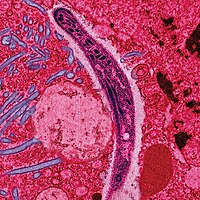
Photo from wikipedia
This study examines healthcare use in 2011 for communicable diseases among migrant workers compared with Thai workers in Thailand. The relative risks (RRs) of 14 communicable diseases (803,817 cases between… Click to show full abstract
This study examines healthcare use in 2011 for communicable diseases among migrant workers compared with Thai workers in Thailand. The relative risks (RRs) of 14 communicable diseases (803,817 cases between ages 18 and 59) were calculated using the National Epidemiological Surveillance System, a nationwide hospital database. Regarding the migrant workers, 71.0% were Burmese and 17.3% were Cambodians. Significantly high comparative RRs for migrant workers were found for tuberculosis (TB) (male, RR=1.41; female, RR=2.33), sexually transmitted infections (STIs) (male, RR=2.39; female, RR=1.64), and malaria (male, RR=8.31; female, RR=11.45). Significantly low comparative RRs for migrant workers were found for diarrhea (male, RR=0.39; female, RR=0.28), food poisoning (male, RR=0.33; female, RR=0.24), dengue (male, RR=0.82; female, RR=0.68), and others. By occupation, RRs for TB and STIs were high among laborers but low among farmers. RRs for malaria among farmers (male, RR=18.26, female, RR=25.49) was higher than among laborers (male, RR=10.04; female, RR=13.93). The study indicated a higher risk of TB, STIs, and malaria for migrant workers, but a lower risk of diarrhea, food poisoning, dengue, and others. Although general health support program for migrants have promoted maternal and child health, prevention of communicable diseases should be further strengthened to meet the needs of migrants.
Journal Title: Industrial Health
Year Published: 2017
Link to full text (if available)
Share on Social Media: Sign Up to like & get
recommendations!